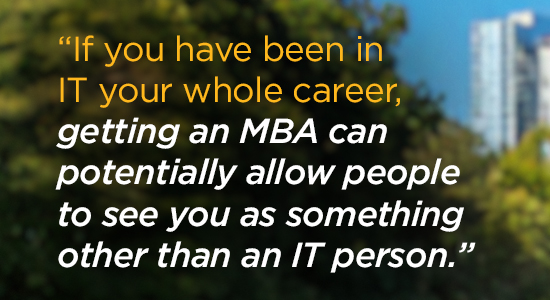From Plebe to Partner
Kerry McNair leads a life driven by challenges, learning opportunities
By Franci Rogers
When faced with challenges, retired Army Capt. Kerry McNair learned early on that if he gave his best efforts, even adversity could present opportunity. It was true when he attended West Point and it is true today, as he helps companies deal with the fallout of a global pandemic.
McNair, who earned his MBA from Baylor University in 2002, is a consultant with The Partnering Group, where he advises clients in a variety of areas including supply chain network design and optimization, as well as performance improvement.
He grew up in El Paso, Texas, in a military family.
“I come from a big family, and I had to figure out a way to pay for college, but I also knew I wanted to serve my country,” McNair said.

Kerry McNair, MBA ’02
Partner, Supply Chain—The Partnering Group
Atlanta, Georgia
He was accepted to the United States Military Academy at West Point and graduated in 1984.
“The possibilities are endless there,” he said. “Being among a group of people who are the very best, it makes you think, ‘I am going to have to do my very best just to get by, just to survive.’ But it opens up the world.”
He rose to the rank of captain in the Army Corps of Engineers before leaving the service for a career in business. But he never lost that knowledge that pushing himself to be the best would open more opportunities.
That drive eventually led McNair to Baylor’s Executive MBA program in Dallas.
He had been working in supply chain for Procter and Gamble for several years when he began to consider furthering his education. When the company relocated him to Texas, he learned about Baylor’s program.
The convenience of the schedule was what initially caught his interest, but McNair said his goal was to become more versatile.
“I had no business background when I started my private sector career,” he said. “I knew it was potentially risky to spend my whole career in one place. Baylor’s MBA program helped me understand what else was out there.”
Another attractive part of the program was the way it was structured, McNair said.
“It ended up being a lot more work than I thought, a lot more working with fellow classmates than on your own,” he said. “I got a lot more out of it than I imagined, just being exposed to different aspects of business and the network you create. You get as much from the other people as you do from the program.”
McNair encourages anyone thinking about Baylor’s EMBA program to consider where they want their career to go and the return on investment.
“An MBA might not be required to do what you want to do,” he said, “but it can accelerate how you get there.”
McNair also said an MBA can change a company’s perception of an employee or job candidate.
“An MBA can be a palate cleanser,” he said. “If you have been in IT your whole career, getting an MBA can potentially allow people to see you as something other than an IT person. Maybe you would be considered by another area. It can help you change direction.”
McNair found that multifaceted education to be useful.
“I was competing for jobs where my knowledge of [profit and loss statement] helped me, and my knowledge of accounting helped me,” he said. “Learning to grow and do different things gave me versatility.”
McNair went on to work at Coca-Cola where he became the vice president of operations for their home market, director of global supply chain for their Walmart group and an internal supply chain improvement consultant.
Since retiring from Coca-Cola, McNair has been working as a consultant, bringing his expertise to even more diverse areas.
“There are still things I want to learn,” he said. “Right now, with the pandemic, businesses are looking for new ways to reach their customers, and I am looking at e-commerce profitability. That is perfectly suited for the times right now.”
But McNair is adapting what has been done before. He is currently working on the problem of how businesses can maintain some of the services they put into place—like home delivery—and still make a profit.
“Retailers and suppliers need to find sustainable solutions,” he said. “So I am taking what I know about shared supply chains and profitability and coming up with ways to make this successful into the future.”
McNair is also an adjunct professor at Georgia State University and is a contributing editor of a soon-to-be-published book about leadership, “Plant Manager.”
“I want to keep growing, keep learning,” he said.

